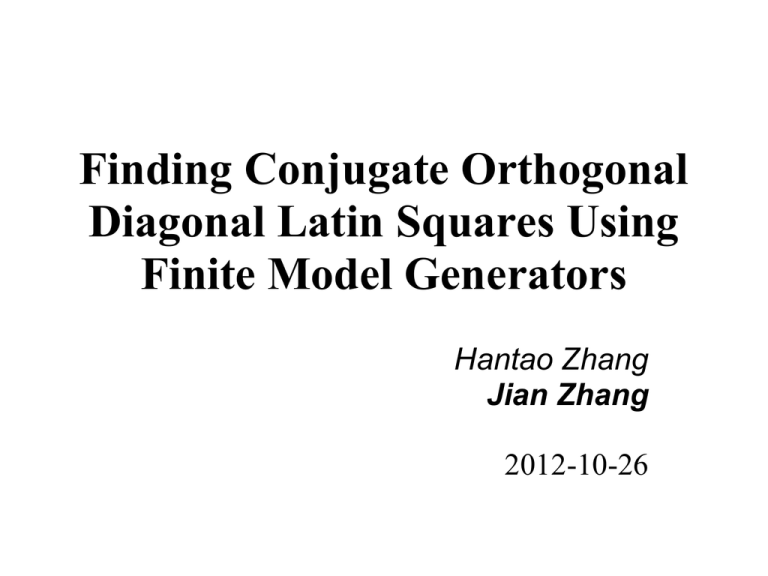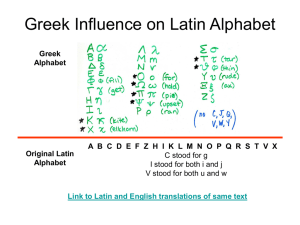slides
advertisement

Finding Conjugate Orthogonal
Diagonal Latin Squares Using
Finite Model Generators
Hantao Zhang
Jian Zhang
2012-10-26
Outline
• Introduction (Latin squares, SAT, finite models)
• Concepts and Definitions
-- Conjugate Orthogonal Diagonal Latin Squares
• Solution of an Open Case
-- formalization in first-order logic
• Conclusion
Introduction
Latin square problems
• Latin squares (quasigroups)
123
312
231
012
201
120
• Challenging problems in mathematics
– Counting problem
– Existence of Latin squares with certain properties, e.g.,
Mutually orthogonal Latin squares (MOLS)
Orthogonal Latin squares
A pair of latin squares
A=(aij) and B=(bij) are
orthogonal ( A ┴ B) iff
the ordered pairs (aij,bij)
are distinct for all i and j
A ┴ AT
The pairs (aij,atij) are
(0,0) (2,3) (3,1) (1,2)
(3,2) (1,1) (0,3) (2,0)
(1,3) (3,0) (2,2) (0,1)
(2,1) (0,2) (1,0) (3,3)
Solving Latin square problems with computers
• Computer-aided research in combinatorics
– existence of small Latin squares – crucial !
• Clement Lam and other mathematicians
• AI researchers (using CSP / SAT / …)
–
–
–
–
Jian Zhang (1990/1991)
M. Fujita, J. Slaney, M. Stickel (IJCAI-1993, 1995)
Hantao Zhang, W. McCune, …
C. Gomes, O. Dubois and G. Dequen, …
SAT
•
Given a formula in the propositional logic,
decide whether it is satisfiable or not.
(p ∨ ┐q) ∧ (q ∨ ┐p)
satisfiable: p = TRUE, q = TRUE.
•
•
Many problems can be transformed into SAT.
Tools (SAT solvers):
SATO (1997), zChaff (2001), minisat (2005), …
Finite model generation/searching
•
Given a formula in the first-order logic, decide
whether it is satisfiable or not in a fixed finite
domain ([0, 1, …, n-1]).
forall x,y,z: y≠z f(x,y) ≠f(x,z)
forall x,y,z: x≠z f(x,y) ≠f(z,y)
•
Tools (finite model generators):
Finder (~1994), SEM (1995), Mace4 (~2003), …
• SEM input:
3.
y = z | f(x,y) != f(x,z).
x = z | f(x,y) != f(z,y).
• SEM output:
f|012
|
0|012
1|120
2|201
Mace4 Input for qg5.8
assign(domain_size, 8).
% clear(negprop).
set(verbose).
clauses(theory).
x * z != y * z | x = y.
x * y != x * z | y = z.
x * x = x.
(((y * x) * y) * y) = x.
end_of_list.
Mace4 Output for qg5.8
interpretation( 8, [number=1, seconds=0],
[ function(*(_,_),
[ 0, 2, 6, 5, 1, 4, 7, 3,
7, 1, 5, 6, 2, 3, 0, 4,
3, 6, 2, 1, 5, 7, 4, 0,
1, 7, 4, 3, 0, 6, 2, 5,
6, 3, 0, 7, 4, 1, 5, 2,
2, 0, 3, 4, 7, 5, 1, 6,
5, 4, 7, 0, 3, 2, 6, 1,
4, 5, 1, 2, 6, 0, 3, 7 ])
]).
Concepts and Definitions
• transversal in a Latin square: a set of positions,
one per row and one per column, among which the
elements {0, 1, …, n-1} occur exactly once each.
• diagonal Latin square -- main diagonal is a
transversal; back diagonal is also a transversal.
• The following is a DLS:
0 2 3 1
3 1 0 2
1 3 2 0
2 0 1 3
Conjugates
• Given a Latin square defined by f(x,y), we may
obtain its conjugates in the following way:
•
•
•
•
•
•
f123(x,y) = z;
f132(x,z) = y;
f213(y,x) = z;
f231(y,z) = x;
f312(z,x) = y;
f321(z,y) = x.
•
LS
1423
2314
4132
3241
(2;1;3)-cjg (3;2;1)-cjg
1243
1324
4312
2413
2134
4231
3421
3142
• (2;3;1)-cjg (1;3;2)-cjg (3;1;2)-cjg
1243
1342
1324
3421
3124
3142
2134
2431
4231
4312
4213
2413
Latin square with a hole
Given a symbol set S and a subset H of S. If a Latin square
L satisfies the following equations
forall x,y,z: y≠z f(x,y) ≠f(x,z)
forall x,y,z: y≠z f(y,x) ≠f(z,x)
other than (x,y), (x,z), (y,x), (z,x) in H2
we say L is a Latin square with the hole H.
Example:
S = { 0, 1, …, 7 }
H = { 3, 4}
0
7
5
2
1
4
3
6
7
1
6
0
2
3
5
4
5
6
2
1
0
7
4
3
6 2 3 4
5 0 4 2
7 1 0 3
6 7
7 5
0 6 5 1
2 7 1 6
1 5 2 0
1
3
4
5
6
2
0
7
An Open Problem
Given integers v and n, let ICODLS(v, n) denote a pair of
orthogonal Latin squares (A, B) of order v with a
hole of size n, where B is the (3,2,1)-conjugate of A;
both A and B are diagonal.
We knew the existence of ICODLS(v, n) for all possible
feasible values, except possibly (n, v) = (11, 3).
Example:
ICODLS(8, 2)
0
7
5
2
1
4
3
6
7
1
6
0
2
3
5
4
5
6
2
1
0
7
4
3
6 2 3 4
5 0 4 2
7 1 0 3
6 7
A
7 5
0 6 5 1
2 7 1 6
1 5 2 0
1
3
4
5
6
2
0
7
0
4
3
6
5
2
7
1
3
1
4
5
7
6
2
0
4
3
2
7
6
0
1
5
5 1 2 7
7 2 6 5
6 0 7 1
0 2
B
1 0
1 7 5 4
0 5 3 6
2 6 4 3
6
0
5
1
2
3
4
7
Solution of an Open Case
First Order Logic Formulas
Latin Square Constraints:
A(x,y) = A(x,z) → y = z
A(x,y) = A(z,y) → x = z
A┴B:
A(x1,y1)=A(x2,y2) ∧ B(x1,y1)=B(x2,y2) → x1=x2 ∧ y1=y2
Latin Square Constraints with a hole:
(A(x,y) = A(x,z) → y = z) \/ h(x,y) \/ h(x,z)
(A(x,y) = A(z,y) → x = z) \/ h(x,y) \/ h(z,y)
A┴B:
(A(x1,y1)=A(x2,y2) ∧ B(x1,y1)=B(x2,y2) → x1=x2 ∧ y1=y2) \/
h(x1,y1) \/ h(x2,y2)
Finding the ICODLS with SAT solvers
• Generating propositional formulas:
Introduce boolean variables Vijk (i,j,k ∈ [0, n-1])
Vijk = 1 iff A(i,j) = k
Vijk = 0 iff A(i,j) ≠ k
• Using SAT solvers (minisat, Glucose)
not completed (> two weeks)
set(arithmetic).
assign(domain_size, 11).
assign(selection_order, 2).
op(400, infix, [@,g,f]).
formulas(theory).
% define hole
h(4,4).
h(4,5).
h(4,6).
h(5,5).
h(5,6).
h(6,6).
-h(y,x) | h(x,y).
-h(x,y) | x = 4 | x = 5 | x = 6.
-h(y,x) | x = 4 | x = 5 | x = 6.
x @ y != z | -h(x,z).
x @ y != z | -h(y,z).
Mace4 input
% define main and back diagonals
x = y | (x @ x) != (y @ y) | h(x,x) | h(y,y).
x = y | (x @ SUB(10, x)) != (y @ SUB(10, y)) |
h(x,SUB(10,x)) | h(y, SUB(10, y)).
x = y | z @ x != x | z @ y != y | h(z,x) | h(z,y).
x = y | z @ SUB(10, x) != x | z @ SUB(10, y) != y |
h(x,SUB(10,x)) | h(y, SUB(10, y)).
Mace4 input
(cont.)
% quasigroup axioms (equational)
x @ (x g y) = y | h(x,y).
x g (x @ y) = y | h(x,y).
(x f y) @ y = x | h(x,y).
(x @ y) f y = x | h(x,y).
% Orthogonal to its (3,2,1)-conjugate
(u @ y) @ y != (u @ w) @ w | y = w | h(u,y) | h(u,w) | h(w,y).
end_of_list.
======== DOMAIN SIZE 11============
======== MODEL ===================
interpretation( 11, [number=1, seconds=1154566], [
function(@(_,_), [
3, 9, 2, 5, 7, 8, 0,10, 6, 4, 1,
0, 2, 9, 6, 8, 7, 1, 3, 4,10, 5,
8, 4, 7, 3,10, 1, 2, 5, 9, 6, 0,
4, 6, 5,10, 9, 0, 3, 2, 8, 1, 7,
9, 0,10, 8, 0, 0, 0, 1, 7, 3, 2,
1,10, 0, 2, 0, 0, 0, 9, 3, 7, 8,
2, 7, 1, 9, 0, 0, 0, 0,10, 8, 3,
5, 3, 4, 0, 1,10, 7, 8, 2, 9, 6,
6, 5, 3, 7, 0, 9, 8, 4, 1, 2,10,
10, 8, 6, 1, 2, 3, 9, 7, 5, 0, 4,
7, 1, 8, 4, 3, 2,10, 6, 0, 5, 9 ]),
……
Mace4 Output
Conclusion
We solved an open case:
existence of (3, 2, 1)-ICODLS(11, 3) .
We presented the formalization of the problem in FOL.
Other cases remain open:
e.g., the existence of (3, 2, 1)-CODLS(10), …
Challenging benchmarks for constraint solving,
SAT solving and finite model generation.
Thank you!









